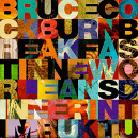December 1999
Right after Humans Cockburn virtually abandoned the acoustic guitar for electric and traveled through many musical styles as he traveled the world. Although I’ve followed his music almost religiously, I haven’t found any one album as rewarding as Humans. Pieces here and there impressed me, but overall they weren’t of the same caliber -- until now. Breakfast In New Orleans, Dinner in Timbuktu is the first Cockburn album in some 20 years that, in its entirety, has pushed my buttons like Humans. It is an accomplished and highly polished disc, beautifully recorded, that showcases some of his finest songwriting to date. This album seems to take that last 20 years of musical experimentation and mix it back where Cockburn’s acoustic folk career left off. While it could still be called folk, it's far more adventurous than to be pigeon-holed like that. The faster-paced "When You Give It Away" with its biting lyrics, opens the disc and shows that Cockburn’s critical eye hasn’t relaxed. He’s always had a social conscience, and many times he used his songs to elevate his cause. However, it’s lighter weight in this regard compared to over-the-head thumpers like "If I Had a Rocket Launcher." Instead, it isn’t the lyrical content that makes this album special; it the surprising mix of musical styles that shine through the rest of the album -- jazz, folk, rock and African styles all show up here. "Mango," the second track, has a relaxed, infectious melody with vocal harmony by Margo Timmins of The Cowboy Junkies. The easy-going feel of this song would be right at home on Humans. "Blueberry Hill" (yes, that "Blueberry Hill") also features Timmins, but in a duet instead of background vocals. This song, mind you, is OK but probably the weakest of the album. The opening guitar on "Last Night of the World" sounds strangely like "Tokyo." Whether that’s deliberate or not, I’m not sure, but it at least seems to be a gentle reminder. "Isn’t That What Friends Are For" shines with excellent recording quality that highlights Cockburn’s deep and resonant voice and showcases Lucinda Williams doing harmony this time. Although almost all the songs are top-notch here, this is one of the best. Williams also shows up on a number of tracks, and her ethereal voice lends a haunting presence. "Look How Far" is perhaps my favorite. Cockburn also recruits Jonell Mosser to do backup duty on "Last Night Of The World" and "The Embers of Eden." Most of the songs on Breakfast feature female accompaniment, and the more I listened to this album the more I realize how much Cockburn has come to rely on strong-voiced females for backup. Cockburn has a powerful speaking voice, but he’s not the world’s finest singer. Having someone accompany him seems to bring a bit more musicality to each song. This isn’t the first album he’s done it on, but it’s definitely the best. Unlike some of his previous albums that had smatterings of greatness on various tracks, Breakfast In New Orleans, Dinner in Timbuktu once again delivers that singular Cockburn vision -- like Humans, it’s cohesive. In writing this review I had the chance to reflect on almost every album of Cockburn’s career, and this made me appreciate this album more. No, this isn’t Humans, but it’s close -- darn close and highly recommended. GO BACK TO: |
 Bruce Cockburn - Breakfast
in New Orleans, Dinner in Timbuktu
Bruce Cockburn - Breakfast
in New Orleans, Dinner in Timbuktu![[Reviewed on CD]](../format/regcd.gif) For
almost 20 years I’ve been waiting for the next great Bruce Cockburn album. As this
century closes, I got it. In 1980 Cockburn delivered his musical masterpiece, Humans,
that, to me, marks the high point of his three-decade career (he first started recording
in the early 1970s). I was 17 at the time I purchased it and not exactly a prime candidate
to listen to a guitar-playing folksinger. However, that album affected me like few others,
and Humans was welcome alongside, say, London Calling from The Clash into my
personal musical pantheon. "Rumours of Glory" and "Tokyo" were the
minor radio hits spawned from Humans, which many people know. But it is the tracks
like "Fascist Architecture," "Grim Travellers," "Rose Above the
Sky" and "How I Spent My Fall Vacation," songs with vivid imagery and
stories, that push Humans into greatness. The entire album is a view of the world
through Cockburn’s eyes.
For
almost 20 years I’ve been waiting for the next great Bruce Cockburn album. As this
century closes, I got it. In 1980 Cockburn delivered his musical masterpiece, Humans,
that, to me, marks the high point of his three-decade career (he first started recording
in the early 1970s). I was 17 at the time I purchased it and not exactly a prime candidate
to listen to a guitar-playing folksinger. However, that album affected me like few others,
and Humans was welcome alongside, say, London Calling from The Clash into my
personal musical pantheon. "Rumours of Glory" and "Tokyo" were the
minor radio hits spawned from Humans, which many people know. But it is the tracks
like "Fascist Architecture," "Grim Travellers," "Rose Above the
Sky" and "How I Spent My Fall Vacation," songs with vivid imagery and
stories, that push Humans into greatness. The entire album is a view of the world
through Cockburn’s eyes.